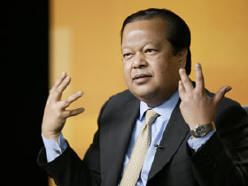Mind, Inner Decay and Illusion
Prem Rawat's 'message' as 'an 'inspirational speaker' seems intractably linked to his earlier 'message' as 'spiritual teacher'. The problem arises because while Rawat has comfortably made a presentational transition, he has been unable to find a linguistic alternative with which to deliver the new 'inspirational' message. Although subject to an extraordinary degree of revisionism Rawat's core references are still to the 'falsity of the human mind, to a fear of 'inner decay' and to the inadequacy of the physical world and human relationships and that He is the sole source of true love and transcendance.
The quotes on the right of this page all underline frequent themes of Prem Rawat's speeches: that one's mind is an enemy which has to be tamed or transcended and this requires Prem Rawat's Knowledge; that one would experience great suffering, and even disintegration, if one ceased practising the 'Knowledge'; and that the world is an illusion.
The majority of those who have been taught meditation by Prem Rawat, no longer follow him or practise his 'Knowledge'. Those who have rejected Rawat's teaching report that using their minds, has been rewarding, not bothersome, and that giving up the Rawat ethos has been a release from a constricting mindset.
They also note that they have not 'rotted' or disintegrated, as Prem Rawat promised they would. Retrospectively, many now believe this to be a cult technique of "phobia conditioning."
Finally, very few former followers regard the world as illusory or non-existent, and tend to look back on the days when they believed Prem Rawat's doctrines as being both escapist and dysfunctional.
Grace:
The Rawat meditation techniques of 'light', 'music ', 'holy name' and 'nectar' (these days known as techniques one, two, three and four) are taught by thousands of gurus in India and by several Western teachers. Thus any claim of exclusivity must either be false or lie in some realm other than the physical. Yet this is a vague element of Rawat's claim to Mastership. If pressed, his followers will sometimes claim he has a unique 'grace' which facilitates his ability to transmit 'Knowledge' to others though he uses a circular argument that as he can "transmit 'Knowledge' to others" then he is obviously qualified to do so and if such transmission doesn't occur then the fault is not in him, the fault is in you.
Is 'Knowledge' one thing?
Rawat has long claimed that 'Knowledge' is 'one thing'. Notions of its 'wholeness' and 'unity' have been put forward many times.
Yet neuroscientists have determined that 'spiritual' experiences such as 'Knowledge' (and many other meditation-derived states) are wholly neurological in nature. That is, we need look no further than the brain to explain them, as clear, understandable causes can be found there.
Specialists in what is loosely known as 'neuro-theology' have further found that the elements of peace, 'unity with the world', security, bliss or joy, 'the sense of a superior power', and so on, each derives from a separate part of the brain. Those areas, too, have all been identified.
Thus it would appear that 'Knowledge', and the many experiences like it claimed by adherents of other groups, are neurologically and experientially, comprised of many elements.
Should premies meditate all the time?
Rawat is often criticised for failing to help premies get established in meditation, which for some can be arduous or confusing. It is sometimes claimed that the 'follow-up' provided to those who receive 'Knowledge' is inadequate. In the 1970s, Rawat's instructors were usually on hand to provide advice and guidance though Rawat often derided them and any claims to understanding imputed to them. These days there are no instructors, thus there is no-one to guide premies through difficult times with the techniques, or the broader difficulties which sometimes arise.
In evidence of this, it has been said that Rawat has never clarified 'the third technique' of meditation - once known as 'Holy Name' or 'the Word'. This is essentially a breath meditation. (Premies were once told to imagine the sound of the phrase 'soham' (pronounced sohung) as their breath went in and out, but this aspect has now been dropped.)
Hans Rawat, and then Prem Rawat until the mid-1970s, insisted on their followers meditating on the breath at all times - working, eating, resting, or doing anything else.
What I have is a constant LSD. It's not LSD, it's like a built-in LSD which God provided you with when you were born. When you get into it, you're always blissed out. There's no need to come down from it. You can do all your daily activities. This Knowledge is so beautiful that you can walk and still meditate on it. You can do anything and still meditate on it. - Guru Puja Festival, Montrose Colorado, July 27 1972
This is something more easily said that done and as Lucy Dupertuis explained in her Ph.D thesis:
Finally, premies try to simplify their activities, often preferring simple manual jobs and dropping school, hobbies, travel, or reading. They sometimes come to fear doing anything complicated or challenging for fear that "getting into it" or "losing one's focus on GMJ" will ruin their meditation.
Rawat later abolished that requirement, though this has never been formally stated. Rather, oblique hints have been given that meditating constantly on the breath is 'impossible' or 'impractical' - but the exact requirement has never been laid down.

